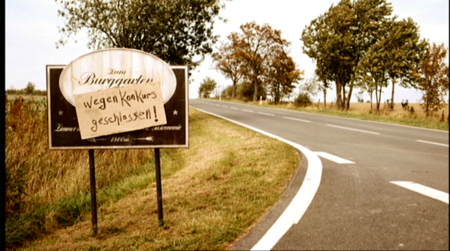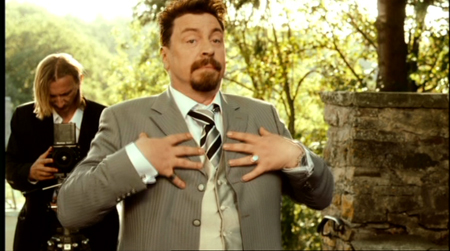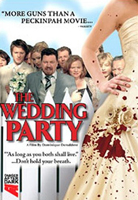BUY IT AT AMAZON: CLICK HERE!
STUDIO: TLA Releasing
MSRP: $19.99
RATED: NR
RUNNING TIME: 92 Minutes
SPECIAL FEATURES: None
The Pitch
"It’s
Titus
Andronicus meets
The Humans
German
versions of Tim Robbins and Tim Curry! Uwe Ochsenknecht and Armin Rohde, plus
Josef Heynert, Lisa Potthoff, Sandra Borgmann, Imogen Kogge.
The Nutshell
Hermann
Walzer (Rohde) wants to purchase an isolated mountain chateau owned by Franz
Berger (Ochsenknecht.) Hermann, a big businessman, is used to getting what he
wants, but Berger refuses, hoping to maintain the property and its bed and
breakfast services on his own. One afternoon, Hermann brings his son’s wedding
party to the chateau for a dinner and a last attempt at cajoling Berger to
sell. Berger once again refuses. Hermann’s temper flares, and, in a series of
action that take place before their owners have time to think, Berger kidnaps
Hermann’s wife and their son’s young bride, locking the rest of the wedding
party outside the chateau’s stone walls.
Before
long, the entire Walzer clan is laying siege to the chateau. As the standoff
stretches into the night, it becomes apparent that no one can put the day aside
until a little blood has been spilled, a little perceived debt washed clean.

Translation: "Bug off! We’re playing Conker’s!"
The Lowdown
The Wedding Party is billed as a comedy, but don’t
expect to laugh. I’m still puzzling over exactly how the plot functions as a comedy,
since its timing has more in common with a tragedy — except for at the ultimate
resolution — and its satire is wholly optional. More unavoidable is the story
of ill-advised behavior, crudely chosen and stubbornly maintained.
All those
behaviors are dictated, in this case, by the men of the house. Berger leads his
small troupe of guests (wedding party excepted) and employees into the standoff
without consulting any of them. Likewise, Hermann Walzer wrangles his clan into
facing down the fortified chateau, whether by force or by appealing to their
likeminded impulses. As Shakespeare often exemplified, families (biologic or
contextual) are forces larger than their components. The father figure works as
nominal leader, but he has only about as much control over events as does a
Kindergarten teacher over her students. When families clash, their members clash
in strange, chaotic ways, often moving in the general direction the father
intended, but almost never in the predicted fashion.

"I am the very model of a modern Major General…"
In that
it features myriad stories of inter-family conflict, The Wedding Party recalls
a lot of the deftness of Altman’s
exaggerated behavior, comedies at their origins; but the momentum given by
initial, comedic situation extends into much more tragic character
interactions. Imagine a sit-com scenario, and then imagine that, say, Steve
Urkel had a personal vendetta against Carl for the latter’s authoritarian
demeanor, and followed that vendetta believably, instead of falling on his
prat. That’s kind of how The Wedding Party plays out.
There’s a
current of class warfare that flows beneath the whole story, springing from
Walzer’s superiority complex over poor, struggling Berger. Rather than dipping
into it for a moral, though, it is employed to enforce the character
disparities between those two men. It provides the impetus to action. Since its
presence is blatant, an umbrella moral could be teased out of it, but there’s a
far better one in place — one which requires less stretching to attain. Instead
of dividing humans into class structures, The Wedding Party embraces a wider,
humanist approach in the portrayal of its characters.

"I like apple pie, warden."
There is
a startling amount of violence in the film, and none of it is of the
"Hell, yeah!" variety. However, there is only one death. Without
spoiling the tense conclusion, I can say that how the families on either side
of the gate deal with the fallout of these violent acts carries more moral
weight than anything preceding it. Humans must
matter to each other if a society on any scale is to survive. Compassion is
optional (though it comes like a balm in the less-tragic sequences here) but
involvement can not be.
I’m
really pleased with how The Wedding Party paced and
concluded its plot. I’m always on the lookout for modern tragedies, and though
this one doesn’t reach the body count of its English class progenitors, its diligence
and dignity make it well worth experiencing.
The Package
Nothing. Nichts.
7.5 out of 10
